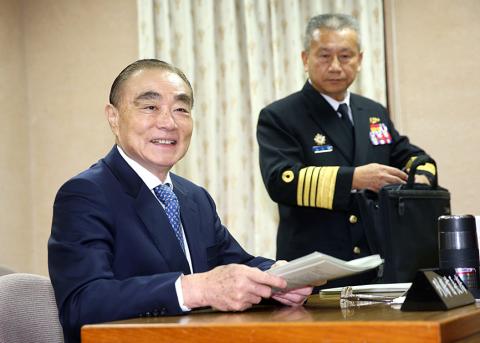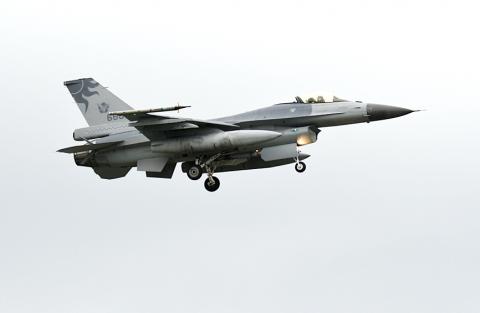The military yesterday carried out a nationwide air defense exercise to test its air warfare capabilities and military response time, following two training missions conducted by the Chinese air force involving aircraft circling Taiwanese airspace.
The routine exercise, code-named Lien Hsiang (聯翔), was held from 6am to 8am.
The navy deployed destroyers and frigates and the army mobilized missile defense units to conduct a joint anti-aircraft drill, while the air force sent up F-16 jets to act as an opposing force to test the air defense capabilities of the armed forces, media reports said.

Photo: CNA
Two F-16s based in Hualien, reportedly fitted with two fuel tanks to increase flight duration and range, were scrambled to conduct intercept training.
However, the Ministry of National Defense refused to comment on the reported operations or reveal what troops and weapons were deployed in the drill, saying only that different branches of the armed forces across the nation were activated.
The exercise had long been planned for yesterday as part of the military’s annual training schedule, and the operation was not related to recent Chinese military activities around Taiwanese airspace, Minister of National Defense Feng Shih-kuan (馮世寬) said during a budget review at a meeting of the legislature’s Foreign and National Defense Committee.

Photo: Yu Tai-lang, Taipei Times
“The exercise is held once every season. The timing is purely coincidental and the drills do not have a specific target,” he said.
Chinese military aircraft flew over the Miyako Strait near Japan’s Okinawa Prefecture and circled outside Taiwan’s air defense identification zone twice in the past three weeks.
“The exercise was designed to familiarize the troops with combat skills. It was also aimed at reassuring the public that the military is combat ready and that fighter jets are engaged in ongoing exercises throughout the year,” he said.
Ministry spokesman Major General Chen Chung-chi (陳中吉) said the seasonal exercise was planned months earlier and China showed no apparent reaction to the routine exercise.
Chen said the Executive Yuan has measures in place to tap a reserve fund for military purposes in response to a remark by US Deputy Assistant Secretary of Defense for East Asia Abraham Denmark that Taiwan’s defense budget is disproportionate to the military threat the nation is facing.
Meanwhile, Coast Guard Administration Director-General Lee Chung-wei (李仲威) said it is “possible” that Chinese navy ships might cruise around Taiwan’s maritime zones following the two training missions by the Chinese air force.
In the event of Chinese naval vessels entering waters within 12 nautical miles (22km) of Taiwan’s maritime territory, the agency would ensure public security in this area, and if a hostile situation arises, relevant mission adjustments would be made, Lee said during a budget review at a meeting of the the legislature’s Internal Administration Committee.
In a wartime scenario, the coast guard would be under the command of the defense ministry and would undertake missions under its direction, Lee said.

The Ministry of the Interior (MOI) is to tighten rules for candidates running for public office, requiring them to declare that they do not hold a Chinese household registration or passport, and that they possess no other foreign citizenship. The requirement was set out in a draft amendment to the Enforcement Rules of the Public Officials Election and Recall Act (公職人員選舉罷免法 ) released by the ministry on Thursday. Under the proposal, candidates would need to make the declaration when submitting their registration forms, which would be published in the official election bulletin. The move follows the removal of several elected officials who were

The Republic of China (ROC) is celebrating its 114th Double Ten National Day today, featuring military parades and a variety of performances and speeches in front of the Presidential Office in Taipei. The Taiwan Taiko Association opened the celebrations with a 100-drummer performance, including young percussionists. As per tradition, an air force Mirage 2000 fighter jet flew over the Presidential Office as a part of the performance. The Honor Guards of the ROC and its marching band also heralded in a military parade. Students from Taichung's Shin Min High School then followed with a colorful performance using floral imagery to represent Taiwan's alternate name

FOUR DESIGNATED AREAS: Notices were issued for live-fire exercises in waters south and northwest of Penghu, northeast of Keelung and west of Kaohsiung, they said The military is planning three major annual exercises across the army, navy and air force this month, with the navy’s “Hai Chiang” (海強, “Sea Strong”) drills running from today through Thursday, the Ministry of National Defense said yesterday. The Hai Chiang exercise, which is to take place in waters surrounding Taiwan, would feature P-3C Orion maritime patrol aircraft and S-70C anti-submarine helicopters, the ministry said, adding that the drills aim to bolster the nation’s offshore defensive capabilities. China has intensified military and psychological pressure against Taiwan, repeatedly sending warplanes and vessels into areas near the nation’s air defense identification zone and across

A Chinese takeover of Taiwan would severely threaten the national security of the US, Japan, the Philippines and other nations, while global economic losses could reach US$10 trillion, National Security Council Deputy Secretary-General Lin Fei-fan (林飛帆) wrote in an article published yesterday in Foreign Affairs. “The future of Taiwan is not merely a regional concern; it is a test of whether the international order can withstand the pressure of authoritarian expansionism,” Lin wrote in the article titled “Taiwan’s Plan for Peace Through Strength — How Investments in Resilience Can Deter Beijing.” Chinese President Xi Jinping’s (習近平) intent to take Taiwan by force